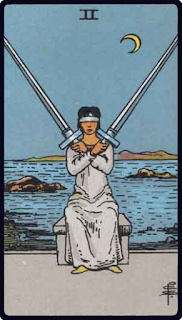
Representing balance; the 2 of Swords takes the idea of balance between knowledge and experience and attempts to implement balance through blindness. The 2 of Swords therefore represents trial and error, our attempt to practice and learn and acquire new knowledge and experience in the absence of prior knowledge or prior experience.
In the upright state the 2 of Swords represents the need to act, no matter what we want to achieve we need to put theory into practice before anything of substance can be created. Without action we cannot gain experience. Where this focus is on positive thoughts and desires, the prompt is to take action no matter how significant that action may seem, you must take at least one step to bring you closer to your desire. Where this focus is on negative desires or fears, the prompt again further underlines the warning not to dismiss negative influences and remain complacent, you must confront them as their power and influence is already growing.
In the inverted state the 2 of Swords represents an imbalance between knowledge and experience, it could portend to a fixation on one element without attention being paid to the other – acting without understanding, or understanding but never putting into practice. Where this relates to our fears and anxieties the inverted 2 of Swords is a warning not to forget context, not to focus on your fear without framing it in the context that it originates.
In the Rider-Waite deck the 2 of Swords depicts an initiate sitting on a stone seat with crossed swords in their hands. The initiate is blindfolded representing their ignorance and blind faith, venturing into the unknown armed with only their limited understanding they pursue learning and training as a means to further knowledge and experience. Above the initiate, a crescent Moon representing risk and danger looks over the initiate, this Moon is not yet full, representing the risk and dangers developing, not yet fully formed.
In self-reflection the 2 of Swords serves as a prompt to consider the balance or imbalance you have when it comes to communicating your internal state. This is best understood in terms of oversharing or being reclusive. Every thought and feeling that we have does not need to be communicated, likewise the people in your life are not psychic they can’t read your mind, what they know relies on what you communicate with them. It’s important to remember that what seem abundantly clear to us might be a complete mystery to others, likewise we may consider ourselves good at reading others but we may be misled by surface impressions that mask underlying thoughts and feelings that can be the exact opposite in nature.
Sharing too much or too little of your internal state can cause problems, there has to be a healthy balance between the two; where this dividing line can be found is often determined by other people. Whilst we may be comfortable sharing everything, or have a desire to share nothing at all, our interactions with others and how constructive or destructive they become over time is determined by which side of this line our level of communication falls. When maintaining a connection to others, whether that be emotionally based or purely intellectual in nature, we need to recognise that the level of communication the other parties need might not match our own and in those instances, we need to adapt and either moderate what we share or find make efforts to communicate more clearly.
Once again, the 2 of Swords is quite heavily connected to the Suit of Cups even if there is no second party involved in the act of communication - where self-reflection is the objective, the context then shifts to the concepts of denial, and repression where we do not reflect on our internal state, or anxiety and depression where we reflect in excess on our internal state.
The most pertinent question to ask when presented this card is “How much time am I devoting to thinking about this?” in the context of your thoughts it’s worthwhile to audit your thoughts by keeping a journal and simply making a two- or three-word description of whatever you spend your time thinking about. Beside each entry make a note of whether this is something you have shared to not, or in the case of self-reflection whether this is something you have tried to repress or embrace.
The goal here is to identify what you are thinking about most and least. The emphasis should be on both frequency and duration, you might spend half an hour thinking about something specific and think that is dominating your thoughts, yet you may be spending 10 minutes several times throughout the day thinking about something else and might not realise over time much more of your energy is being drained by that second thought.

No comments:
Post a Comment
All comments are moderated before they are published. If you want your comment to remain private please state that clearly.